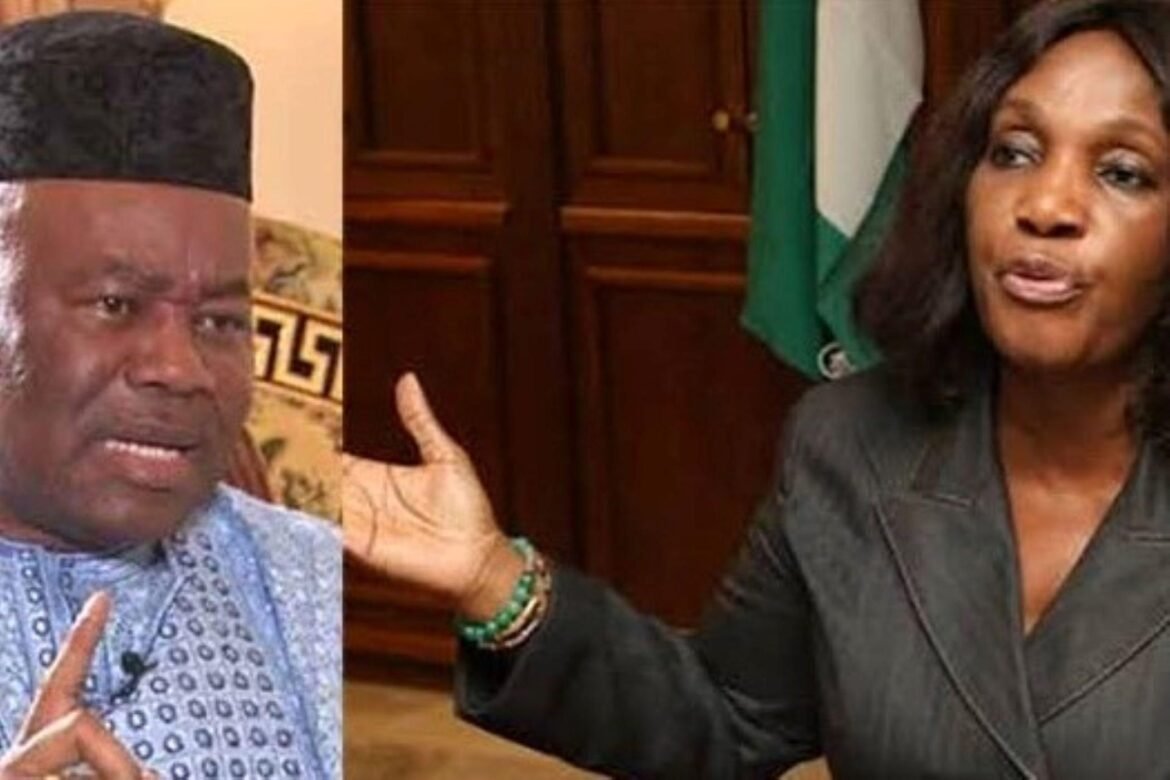Events of the past few weeks in Nigeria illustrate how corruption has graduated into kleptocracy, leaving us in a society where the theft of public assets is so mature that organs and structures to sustain to it are fully functional.
The soul of the nation has been stolen by politicians and influential citizens who drain public office of its lifeblood.
Nigeria has ceased to be managed for the common good, and powerful interests have incorporated a sustainable apparatus to extract for selfish gains.
There is corruption in almost every country in the world, as there are human imperfections.
In some countries, corruption is so rare, it is hardly seen or mentioned.
But in many others, it is so common that it is often part of the conversation.
In Nigeria, corruption is not just a discussion, it is a way of life and a culture.
Dishonesty in public service is somewhat acknowledged as unavoidable.
The 2020 budget of the 469-member National Assembly is double the budget to educate all Nigerians or to provide the public with quality health services
What has not been accepted or fully known is how sophisticated it has become, to the extent that it is a system which can operate like a self-driving car.
Kleptocracy, as opposed to mere corruption, is a more serious challenge.
It is defined as a system “ruled by corrupt politicians who use their political power to receive kickbacks, bribes, and special favours at the expense of the populace, or simply direct state resources to themselves, relatives or associates.”
Reputable American NGO, the Carnegie Endowment, further distinguishes corruption from kleptocracy, positing that in a kleptocracy like Nigeria, “criminal behaviour is not individual, opportunistic, or sporadic, but rather collective, systematic, strategic, and permanent.”
One would be a simpleton not to see that there is a system of greed and opportunism by a class of the influential, when multiple governmental organs conspire, even spanning banking, judiciary, media and political sectors.
What we are observing is a society where there is hand-over, a division of labour among corrupting agents.
There are arteries of corruption in Nigeria.
Politicians work with lawyers, bankers, civil servants, judges, journalists and other such elements to plunder national resources indefinitely.
We now have political vampires so well established that they are not only able to access vital organs that sustain their needs, but are able to retain that access indefinitely.
They are not restricted to party, ethnic or religious affiliation – for the driver is their insatiable interest.
READ ALSO: COVID-19: We Used N1.5bn To Care For Ourselves – NDDC MD
This systemic greed is why our politicians can be in one political party when we go to bed but be in the opposing party before we wake up.
There is no ideology, and there is no public interest.
They have corrupted the political system so much that many Nigerians now live in hopelessness, believing that their votes do not count.
The kleptocrats will buy votes, elections and judicial influence, since, these days, there is hardly any election that is not eventually decided by an election tribunal.
They employ bankers whose specialisation is to maintain a pipeline through which big money moves from the public treasury to secured private accounts around the world.
What we are beginning to see through the scandals at the Niger Delta Development Commission (NDDC), the Economic and Financial Crimes Commission (EFCC) and a few others, is the inside workings of kleptocracy – public offices that have metamorphosed into private banks
In the same manner, those with knowledge of the inside workings of the Nigerian mass media know that some top journalists are lackeys of the powerful.
Some of the people who write news have expensive dinners with highly-placed officials, even abroad, trading advisories and information unethically.
A complex ecosystem has been created where everything and everybody is engineered to pump public funds into private pockets.
The richest persons in the society are often government contractors.
And our political system has become extremely expensive to maintain.
The 2020 budget of the 469-member National Assembly is double the budget to educate all Nigerians or to provide the public with quality health services.
All Nigerians work to feed the kleptocrats.
It is becoming increasingly clear that the government is no longer designed to deliver happiness and security to the people, the very essence of government, but is for the benefit of scoundrels in the hall of power.
This era of scoundrels has grown in stages but has now matured to a level at which Nigerians must be alert and worried.
They must be worried, because kleptocracy can last for a really long time.
Except the chain that feeds it is broken through strong institutions, many of us may never see the Nigeria of our dreams.
READ ALSO: BREAKING: President Buhari Speaks On NDDC Corruption Saga
If anyone is in doubt about the scale of the problem at hand, they should pay attention to some of the on-going drama about the anti-graft war and the pilfering at one of the best funded organs of government.
What we are beginning to see through the scandals at the Niger Delta Development Commission (NDDC), the Economic and Financial Crimes Commission (EFCC) and a few others, is the inside workings of kleptocracy – public offices that have metamorphosed into private banks.
It is important to zoom in on the NDDC, where a faceoff between the Minister of Niger Delta Affairs, Mr. Godswill Akpabio, and the former Managing Director of the agency, Dr. Joy Nunieh, is becoming a scientific representation of organized and insane looting.
With the amount of funding allocated to it, the NDDC should be capable of effectively meeting the needs of millions of poor Niger Deltans, whose community provide the resources that give Nigeria life.
Instead, it has for 20 years become a money printing machine by and for kleptocrats.
Among a few nauseating revelations in the legislative investigation at the Senate are that multiple contracts are awarded for a single job, payments are made as gifts to influential individuals for personal problems, contracts are paid without an inspection and that NDDC staff shared N1.5bn among themselves, totaling half of COVID-19 allowance for millions of people in 10 states.
The most effective way to tackle corruption is to punish the people at the top
If we step back to take an analytic view of the NDDC, we would see an organisation that has become a funnel for corruption, through which its beneficiaries have systematically collected illegal public funds for years without serving the people.
Last week, we saw the Acting Managing Director of the NDDC, Mr. Daniel Pondei, who was summoned by the Senate to respond to questions, lead a daring walkout on the House Committee on Niger Delta, accusing the chairman of the committee, Olubunmi Tunji-Ojo, of reverse corruption.
We may not know if the counter-allegation by Pondei is true, but we all can agree that the NDDC is a laboratory that demonstrates how far-reaching the tentacles of corruption go, how powerless the executive president is to deal with it and how systemic corruption can become so powerful to dare even the highest legislative body.
In 1995, the respected international NGO, Transparency International, started a corruption index, comparing nations against each other in terms of their level of corruption in the public sector.
Out of 100 points for low corruption, Nigeria has averaged 20.98 points from 1996 to 2019, reaching an all-time best result of 28 points in 2016.
In layman’s terms, Nigeria’s ranking is usually above 150 out of the 180 countries surveyed worldwide, and its average score of 20 is below the global average of 43.
With the exception of Guinea Bissau, Nigeria is the most corrupt country in West Africa. That is the extent of the problem we face.
The damaging effects are obvious: from bad roads, to unstable public electricity, derelict hospitals to failing schools, low human capital index to low life expectancy or growing insecurity to rigged elections.
There are yet few signs that the system can self-correct, as it becomes even clearer that the ruling political party, APC, and its anchor, President Mohammadu Buhari, cannot solve the problem as it promised.
The administration itself is filled with the very agents that sustain kleptocracy, so it has been too timid to confront corruption and too weak to punish the powerful.
READ ALSO: ‘I slapped Akpabio Because He Was Sexually Harassing Me,’ Ex NDDC MD, Nunieh Says
The most effective way to tackle corruption is to punish the people at the top.
The people at the bottom will take a cue when those who are deemed powerful and untouchable are arrested, charged and imprisoned.
That is the lesson from Singapore, a prosperous and developed economy, even though far smaller and younger than Nigeria.
What will save Nigeria from systemic corruption is neither a sovereign conference, dictatorship nor military rule as many Nigerians sometime propose.
The people who will manage such experiences are themselves corrupt.
The solution is a politically-active, savvy, educated and demanding electorate, who will insist on free and fair elections. It is through democracy that kleptocracy will hemorrhage to death.
By cleaning up the democratic system, people will vote into power those they trust to weed out the unbefitting structures of kleptocracy.
Cleaning up will be a long, tedious and arduous task of picking an item at a time, until systemic corruption is unable to sustain itself any longer under strong institutions.








